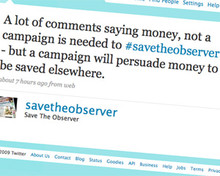
Journalists at Guardian News and Media in London last week unanimously passed a motion 'condemning proposals to downgrade the 200 year-old Observer newspaper' and fight closure and any compulsory redundancies, the NUJ said.
Over the past few weeks, speculation about the future of the title has been widely reported and commented on, in particular suggestions that management at the company are considering various options including closing the Sunday title or turning it into a magazine.
On Friday it was reported that investment group Capital Ideas had made a bid to buy the Sunday title.
Motion passed
"The Guardian and Observer NUJ chapel believes that the survival of the Observer as the world's oldest Sunday newspaper is essential for the protection of pluralism and diversity in the British media and calls on the Scott Trust and GNM/GMG management to reject proposals to drop the title, downgrade it to a weekly magazine or undermine its character as an independent and competitive Sunday newspaper," the chapel's resolution stated.
"The chapel believes that the closing of a 200-year-old newspaper cannot be regarded as in any way comparable to other product changes currently being considered as part of the drive to reduce losses and offers its full support to the public campaign to save the Observer as an independent Sunday newspaper.
"The chapel is committed to the editorial autonomy, resourcing and identity of both the Observer and the Guardian - along with the protection of editorial standards and absolute rejection of compulsory redundancies across all platforms."
The NUJ's head of publishing, Barry Fitzpatrick, pledged the union's continuing support in the face of cutbacks: "There is already a large and growing degree of public support for the paper so it's vital that management engage with the union now and listen to the paper's workers and readers."
Social media campaigns
Grassroots support for the title initially emerged via social media after threats to its future were first reported. On Twitter, Callum Saunders (@callumsaunders) launched a campaign via @savetheobserver, which currently has 2,683 followers.
"I started this campaign purely as a knee-jerk response at hearing the news. As a fan of the paper and a true social media enthusiast, I decided to start the Twitter page as a sort of 'Tweetition'," Saunders told Journalism.co.uk.
"The premise really is to get as many followers following the @savetheobserver Twitter page as possible, with the aim of showing the Guardian Media Group how many value the Observer.
"I hope that the ultimate outcome will be for GMG decision-makers to recognise the number of people speaking on this issue through social media channels, be it Twitter, Facebook etc."
The comedian David Mitchell's support and publicity via Twitter was a great boost, he said: "We’ve seen an inevitable influx of supporters join up since."
Facebook group
Over on Facebook, a campaign group has, at the time of writing, attracted 7,767 members. One of its founders, Dave Nightingale, told Journalism.co.uk that he was prompted to start the group 'after after a witty aside from [journalist] Nick Cohen deriding Facebook groups': "I initially chortled at [the idea], and then thought 'well why not?'"
"Unifying a group of individuals with a common purpose at an accessible location is how change has happened a lot in the past," Nightingale said.
Asked why Facebook, he said that 'accessible location' is a key factor: "There really is no other location that can be used and accessed so easily, or is as well known.
"I have received a terrific amount of support from staff at The Observer. There is a feeling amongst the staff that this can at least boost morale if nothing else and a general appreciation that it was started by a reader."
Group members have also been posting links to other supportive articles around the web, such as a letter signed by a range of high-profile figures to the Times, following the paper's initial report on the Observer's potential fate.
Free daily newsletter
If you like our news and feature articles, you can sign up to receive our free daily (Mon-Fri) email newsletter (mobile friendly).









